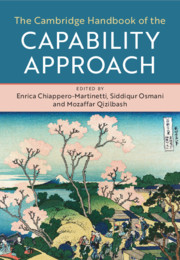Book contents
- The Cambridge Handbook of the Capability Approach
- The Cambridge Handbook of the Capability Approach
- Copyright page
- Dedication
- Contents
- Figures
- Tables
- Contributors
- Foreword
- Acknowledgements
- General Introduction
- Part I Historical Antecedents and Philosophical Debates
- Part II Methods, Measurement and Empirical Evidence
- Part III Issues in Public Policy
- Introduction to Part III
- 25 On Education and Capabilities Expansion
- 26 Capability Approach to Children’s Well-Being and Well-Becoming
- 27 Capability and Disability
- 28 Social Exclusion and Capability Development
- 29 Human Security
- 30 Income Inequality and Human Capabilities
- 31 The Capability Approach and Human Rights
- 32 Capabilities and the Law
- 33 Capabilities, Public Reason and Democratic Deliberation
- 34 Entitlements and Capabilities
- 35 Religion and the Capability Approach
- Index
- References
31 - The Capability Approach and Human Rights
from Part III - Issues in Public Policy
Published online by Cambridge University Press: 11 November 2020
- The Cambridge Handbook of the Capability Approach
- The Cambridge Handbook of the Capability Approach
- Copyright page
- Dedication
- Contents
- Figures
- Tables
- Contributors
- Foreword
- Acknowledgements
- General Introduction
- Part I Historical Antecedents and Philosophical Debates
- Part II Methods, Measurement and Empirical Evidence
- Part III Issues in Public Policy
- Introduction to Part III
- 25 On Education and Capabilities Expansion
- 26 Capability Approach to Children’s Well-Being and Well-Becoming
- 27 Capability and Disability
- 28 Social Exclusion and Capability Development
- 29 Human Security
- 30 Income Inequality and Human Capabilities
- 31 The Capability Approach and Human Rights
- 32 Capabilities and the Law
- 33 Capabilities, Public Reason and Democratic Deliberation
- 34 Entitlements and Capabilities
- 35 Religion and the Capability Approach
- Index
- References
Summary
This chapter examines the connections between the capability approach and human rights. It considers the links between the capability approach and the international human rights framework and discusses the treatment of the relationship between capabilities and human rights within Sen’s research agenda, Nussbaum’s work and the broader literature on the capability approach. Interdisciplinary perspectives spanning law, ethics, public policy and political economy are addressed, and four distinct ‘entry-points’ for examining the connections between the capability approach and human rights are explored. The first focuses on the capability approach as an ‘informational space’ for human rights monitoring, assessment and evaluation. The second focuses on normative concerns and the importance of the capability concept for theoretical thinking about human rights. The third focuses on practical initiatives that explicitly combine the capability approach and human rights as a basis for specific applications and public policies. The fourth addresses the instrumental role that human rights recognitions play within processes of capability expansion (as elements of public action and as mechanisms of broader social change).
Keywords
- Type
- Chapter
- Information
- The Cambridge Handbook of the Capability Approach , pp. 624 - 642Publisher: Cambridge University PressPrint publication year: 2020

